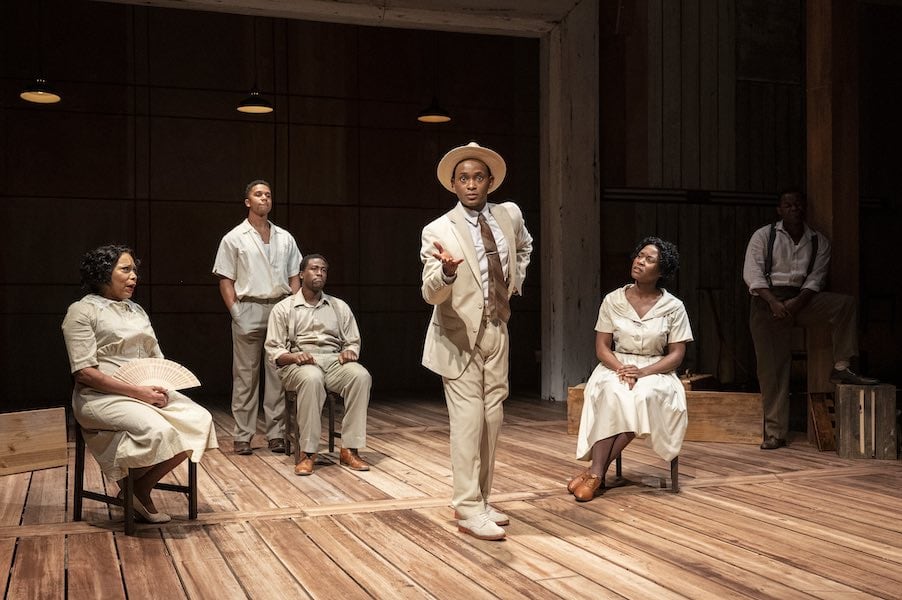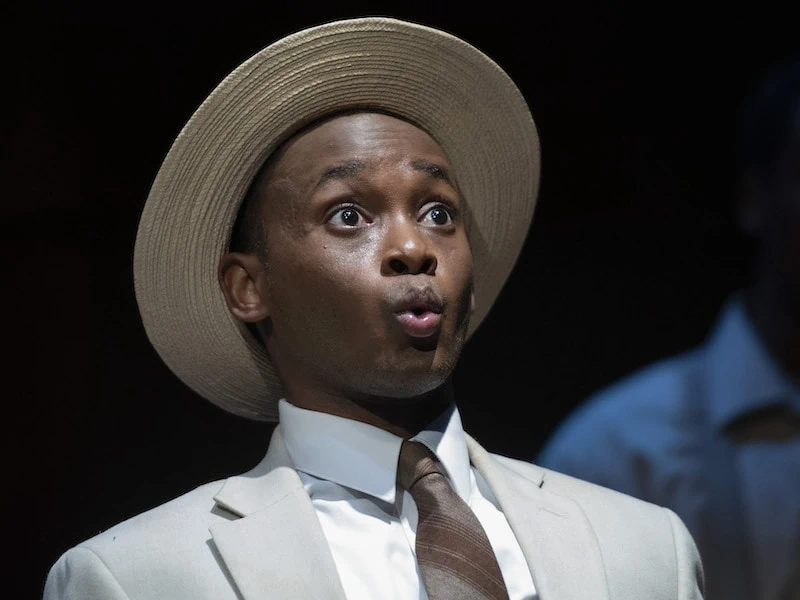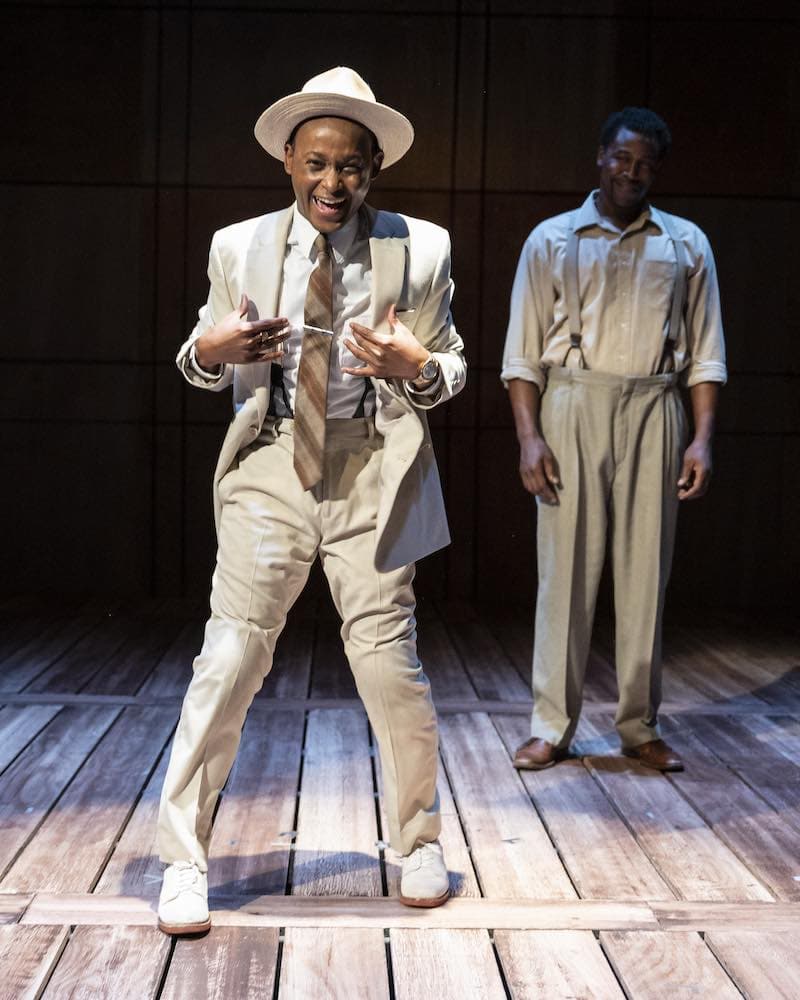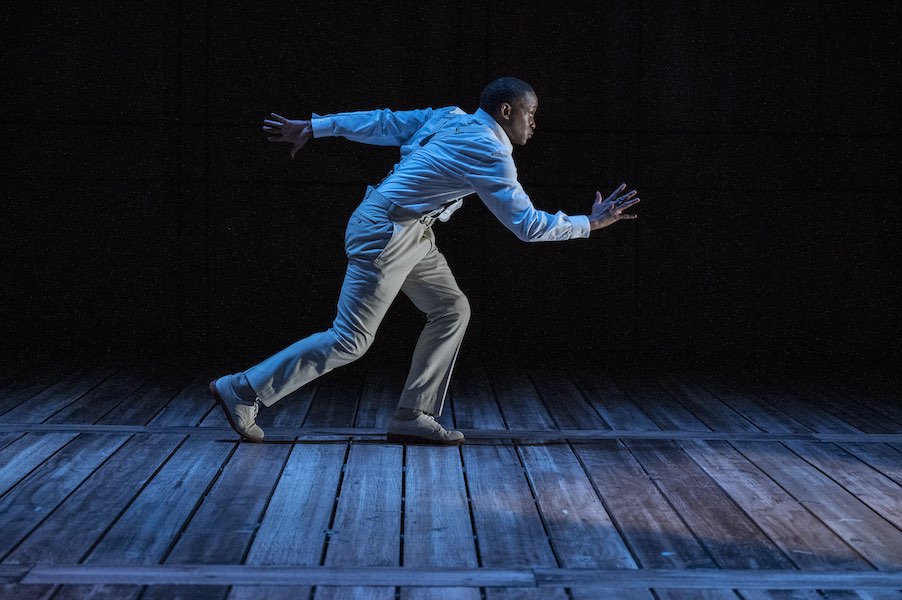With its running time of 90 minutes without an intermission, The Ballad of Emmett Till is the shortest play in Ifa Bayeza’s The Till Trilogy now in repertory at Mosaic Theater. Yet watching The Ballad of Emmett Till is like watching the playing out of an inevitable head-on automobile collision: everything seems to be taking place in slow motion and we seem to see everything in excruciating detail.
Unlike the other two episodes of the Trilogy, Ballad does not employ projection screens on the upstage wall of the set. Instead, all of our attention is focused on the sturdy wooden platform and frame through which light seeps in an eerie way (scenic design: Andrew Cohen, lighting design: Alberto Segarra) and that serve as the protagonists’ homes as well as the place of Emmett Till’s torture and murder.

This show is also suffused with the music from which it gets its title. The play begins in song and has songs at various points during the progression of the play.
Come on let me tell yuh bout the tale of Emmett Till,
You gonna hear this story, someday, some way, somewhere,
I know you will, oh oh oh oh ohh I know you will
Emmett Till (Antonio Michael Woodard) is the central focus of this play and everyone else supports that Promethean effort.
The 14-year-old is in the process of developing into a full human being, which in his case means into a Black man. Meanwhile, the purpose of the white ethno state of Mississippi in 1955 was to oppose and crush the development of the full humanity of anyone who is not white. The inevitable collision takes place. Emmett Till’s life is snuffed out and his humanity violated through the brutal butchering, mauling, and mutilation of his body. This has been a terrifying and traumatizing story for Black Americans from that time to the present.
But the primary focus of this play is not on the traumatic event. Instead, Ballad focuses on Emmett’s role in his family and the world and his process of establishing his place in it. Emmett (who is also called Bo, or Bo-Bo) is an only child, but his life is filled: with cousins, uncles, aunts, and church family and adventures.
The playwright notes: “Essentially, The Ballad of Emmett Till is the story of the boy’s journey. It is his quest for life for joy, his pursuit of happiness.”

So, if we know something about the story, we may not expect what we get when we walk into the theater. Because more than almost anything else…
we see Bo laughing:
BO: “You are now entering the town of Money, Mississippi.” More like Dead-Broke, Mississippi.
MOSE: Everything funny to you.
BO: Just like to have a good time.
MOSE: You seem to work mighty hard at it.
We see him falling in love:
BO: Met a little girl named Heluise,
Wrote her a letter to be my squeeze,
And being frustrated in love:
BO: Haven’t heard back from her yet. Only been three months. But I will.
We see him learning about cars:
SIMMY: You ain’t old enough fuh to drive no Kah.
BO: Snuck out while Mama was sleep. Drove it around the block. Cruisin’.
SIMMY: You lyin’.
BO: Get back. Somebody parked in my spot. Uh-oh. How I’mo put it back?

Antonio Michael Woodard plays Emmett Till with such relentless energy and enthusiasm that we fully empathize with Bo’s uncle Mose (Jasen Bowen) when he finally says:
MOSE: You are exhausting me, boy.
Woodard has a baby face and flexible body that makes him believable as a 14-year-old. In his “brim upturned, blonde Panama straw” and “white buck shoes! Not a scuff on ’em” (costume design: Danielle Preston), Woodard’s Emmett is one lovable and irritating adolescent.
The other ensemble members function like those in Ntozake Shange’s For Colored Girls…. For example, at one point three actors (Jaysen Wright, Vaughn Ryan Midder, Jasen Bowen) portray different aspects of Emmett’s personality as he attempts to convince his mother (a fiercely protective Billie Krishawn) to let him go down south for the summer. The highly versatile Rolonda Watts brings her own brand of motherliness to bear in the roles of grandmother Mamoo and Miss Lizabeth and an adolescent girlishness to Emmett’s would-be girlfriend Heluise. Vaughn Ryan Midder shook the room a bit with his hilarious portrayal of the flirtatious neighbor girl Ruthie May Crawford. Jasen Bowen’s Uncle Mose was touching and Jaysen Wright was elegantly brutal in his portrayal of “white” murderer Roy Bryant. While there are “white” characters in this play, the actors that play them are not “white.” Nor do the actors wear whiteface to portray the “white” characters.
Only upon seeing this casting choice, and noting my own surprise to see it, did I realize the power and necessity of it. For me, not watching “white people” re-enact the torture of a “Black youth” removed one source of re-traumatization and avoided the re-affirmation of white supremacist terrorism in our own imaginations. (This is the opposite of what D.W. Griffith’s Birth of a Nation did. The first movie that was shown in the White House, Birth of a Nation revolutionized film vocabulary and at the same time glorified the Ku Klux Klan, causing Klan membership to rise throughout the country.)
But the Till story is the story. Eventually, we have to get back to its brutality. In this production, the pounding of flesh on wood floor and walls as Roy Bryant, J.W. Milam, and H. L. Loggins tortured Emmett is loud and palpable (fight and intimacy direction: Sierra Young, sound design and original music: Kwamina “Binnie” Biney).

While undergoing the torture at the hands of murderer-torturers, Bo recites to himself:
BO: Be not afraid or dismayed. The battle is not yours, but God’s.
Two parts god, one part man I am NOT going to die.
To the other Black men present:
Why aren’t you listening to me? Why aren’t you lookin at me?
It seems that one question that Bayeza is addressing in the Trilogy is what can we — Black folks especially — do with traumatic parts of our history, when the powers that encouraged and implemented that trauma are still operative? How do we extricate ourselves from this power’s often paralyzing and demoralizing influence?
Ballads such as The Ballad of John Henry or The Ballad of Harry T. Moore serve to keep a memory of our heroes — and the principles they embodied — alive in our awareness. Emmett Till is the martyr and mythical hero in this Ballad. One aspect of the mythical hero is that they experience a transfiguration into eternal life in heaven.
Toward the end of this play, we are invited to contemplate Emmett Till’s transfiguration into eternal life. In the last few lines, a transitioned but not quite transfigured Emmett speaks with his people still on this plane of existence. They inform him of how his death has been a catalyst for change:
BO: But … Wherever I set my feet, there is Death.
MAMIE: Immortality.
MOSE: Justice.
ENSEMBLE: A new world.
BO: It is warm?
MAMIE: It is warm.
BO: There is light?
MAMIE: There is light.
BO: It is safe?
ENSEMBLE: It is safe.
BO: It is done?
That is the last line of the play. The playwright leaves the audience with this question to wrestle with. What can be done to change that question to an affirmative statement? And who can do it?
Running Times:
The Ballad of Emmett Till – 90 minutes no intermission
That Summer in Sumner – 105 minutes, 15-minute intermission
Benevolence – 120 minutes, 15-minute intermission
The Ballad of Emmett Till is part of The Till Trilogy, which plays in repertory through November 22, 2022 — on Wednesdays at 8 PM, Thursdays at 11 AM and 8 PM, Fridays at 8 PM, Saturdays at 3 PM and 8 PM, and Sundays at 3 PM — presented by Mosaic Theater Company performing in the Sprenger Theatre at Atlas Performing Arts Center, 1333 H Street NE, Washington, DC. For the schedule and to purchase tickets ($29–$64), go online or contact the Box Office at (202) 399-7993 or [email protected] from 11 AM – 5 PM Monday through Friday, or two hours prior to a performance.
The program for The Till Trilogy is online here.
COVID Safety: All patrons are required to be masked while inside performance spaces. The use of N95 masks is encouraged. Masks may be optional in other areas of the building, including lobbies. The complete Atlas Performing Arts Center COVID policy is here.
The Ballad of Emmett Till
Written by Ifa Bayeza
Directed by Talvin Wilks
Cast
Antonio Michael Woodard (Emmett Till), Jasen Bowen (Ensemble), Billie Krishawn (Ensemble), Vaughn Ryan Midder (Ensemble), Rolonda Watts (Ensemble), Jaysen Wright (Ensemble)
Creative and Production
Scenic Designer: Andrew Cohen
Lighting Designer: Alberto Segarra
Projection Designer: Mona Kasra
Costume Designer: Danielle Preston
Sound Designer and Composer: Kwamina “Binnie” Biney
Associate Sound Designer: Dominique Perera
Vocal Arranger: Paige Rammelkamp
Additional Arrangements and Music Direction: Rickey Payton, Sr.
Properties Designer: Deb Thomas
Fight and Intimacy Director: Sierra Young
Dramaturg: Faedra Chatard Carpenter
Dialect Coach: Jen Rabbit Ring
Assistant Director and Choreographer: Sandra L. Holloway
Stage Manager: Shayna O’Neill
SEE ALSO:
‘The Till Trilogy’ at Mosaic Theater is beautiful, haunting, and horrifying (overview review of the trilogy by Gregory Ford, October 20, 2022)
‘Benevolence’ in Black and white at Mosaic Theater (review by Gregory Ford, November 1, 2022)
Elusive truth and justice in ‘That Summer in Sumner’ at Mosaic Theater (review by Gregory Ford, November 7, 2022)




